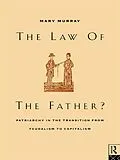In "The Law of the Father?" Mary Murray develops a new perspective on the class-patriarchy relationship. Women's rights in and to property are explored in pre-capitalist and capitalist society. Exploring the links between kinship, property and patriarchy as symbiotic and fundamental to the development of the English state, the relationship between women, property and citizenship is seen as central to the "Law of the Father" and the transition to a "capitalist fraternity."
The book maintains a general link between property and the legal regulation of sexual behaviour. The author criticizes the view that women themselves have been property, arguing that it rests on a historically specific concept of history projected back in history, where no such concept existed, and reflects changes in ways of thinking about property which emerged in the course of the transition from feudalism to capitalism.
Autorentext
Murray, Mary
Zusammenfassung
A coherent and focussed exploration into how Patriarchy constructed pre-capitalist and capitalist society, and its role in the transition from feudalism to capitalism.
Inhalt
Introduction 1 The debate 2 A way forward 3 Marxism and the transition from feudalism to Capitalism 4 Property and patriarchy 5 From 'The Law of the Father' to 'capitalist fraternity'? 6 Sisters, daughters and subordinate wives 7 Women as property
